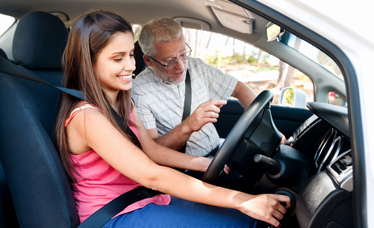Chapter 11 – Section 2
Types of New Jersey Driver’s Licenses
The state of New Jersey issues various types of driver’s licenses for various purposes. The following lists the different types of licenses available, what they are used for, who is eligible, and how to acquire them.
-
A. Graduated Driver’s License (GDL) Program
-
- If you have never had a driver’s license, you must complete the MVC’s Graduated Driver License (GDL) Program, which is designed to increase driver preparation and safety.
- The GDL program extends driving privileges to first-time drivers in stages and requires a period of supervised practice driving time.1
- New drivers must follow all GDL restrictions. Failing to do so may result in a fine of $100 or a possible suspension of the driving privilege. 2
- The steps to complete the GDL program vary depending on your age. You first need to obtain a special learner permit or examination permit and then a probationary license before you can obtain a basic driver’s license.
- GDL, special learner and examination permits are valid until all qualifications for a probationary license are met, or for two years, whichever occurs first.
- Any GDL applicant under 18 years old must present a completed consent form signed by a parent or guardian.3
-
B. Basic Automobile License
-
- This license allows the holder to operate all types of Class D motor vehicles registered by the MVC, except motorcycles.
- A person may apply for this license at the age of 18,or 16 if applying for a permit.
- A person applying for this license must pass the knowledge, vision and road tests.
- The basic automobile license is valid for 4 years.
-
Restrictions (Special Learner’s Permit and Examination Permit)
-
- You must be accompanied by an adult supervising driver who sits in the front and is at least 21, has a valid New Jersey driver’s license, and has at least three years of driving experience.
- You must wear a seat belt and all your passengers must wear a seat belt.
- You may not use cell phones, hand-held video games or any other hand-held electronic deviceswhile driving.
- Any motor vehicle you drive must display red, reflectivedecals on both the front and back license plates (applies to drivers under 21 only). These decals are available from the MVC. Olderdrivers should remove them when driving.
- You may not drive between 11:01 p.m. and 5:00 a.m. (applies to drivers under 21 only).
- You may drive only passengers from your household plus one additional person (applies to drivers under 21 only).
-
C. Probationary Automobile License
-
- This license allows its holder to operate all types of Class D motor vehicles registered by the MVC, except motorcycles.
- The minimum age to apply for this license is 17.
- Drivers 21 and older must practice restricted but unsupervised driving for at least one year before obtaining a basic driver’s license.
- A person applying for this license must pass the knowledge, vision and road tests.
- The probationary automobile license is valid for 4 years.
-
Restrictions (Probationary License)
-
The driving restrictions below apply to probationary license holders.
- You must wear a seat belt and all your passengers must wear a seat belt.
- You may not use cell phones, hand-held video games or any other hand-held electronic devices while driving.
- You may not drive between 11:01 p.m. and 5:00 a.m. (applies to drivers under 21 only).
- You may drive only passengers from your household plus one additional person (applies to drivers under 21 only).
- Any motor vehicle you drive must display red, reflective decals on both the front and back license plates (applies to drivers under 21 only). Older drivers should remove the decals when driving.
-
D. Commercial Driver License
-
- There are three classes of commercial driver licenses: A, B and C. The classes describe the type and weight rating of the commercial vehicle. Examples of commercial vehicles include trucks, tanker trucks, tractor trailers, buses and commercial passenger vans.
- This license allows the holder to operate Class A, B or C vehicles.
- The minimum age to apply for this license is 18. However, to operate a commercial vehicle in other states in addition to New Jersey or to obtain a HAZMAT or passenger endorsement, the minimum age is 21.
- A person applying for this license must pass the commercial, knowledge, vision and road tests.
- The commercial driver license is valid for 4 years.
-
E. Motorcycle License and Probationary Motorcycle License
-
- This license allows the holder to operate most vehicles with fewer than four wheels (Class E). It is issued as a separate license or as an endorsement (M) if the applicant already holds a basic New Jersey driver’s license.
- The minimum age to apply for this license is 17.
- A person applying for this license must pass the knowledge, vision and road tests.
- The license is valid for 4 years.
-
F. Moped License
-
- This license is for those 15 years of age and older who do not have another type of a license. You do not need a moped license if you already have a Class A, B, C, D or E license.
- The minimum age to apply for this license is 15.
- A person applying for this license must pass the knowledge, vision and road tests.
- The moped license is valid for 4 years or until the applicant obtains a basic license at 18.
-
G. Agricultural License
-
- This license allows the holder to drive for farming purposes only.
- The minimum age to apply for this license is 16.
- A person applying for this license must pass the knowledge, vision and road tests.
- The agricultural license is valid for 4 years or until the applicant obtains a basic license at 18.
-
A. The Vision Screening
-

To drive without restrictions, an applicant must have vision no worse than 20/50 in both eyes, with or without corrective lenses.
An applicant for any license or permit must pass the vision screening, whether applying for the first time or renewing. To drive without restrictions, an applicant must have vision no worse than 20/50 in both eyes, with or without corrective lenses. If the applicant has sight in only one eye, that eye must meet the 20/50 requirement and the applicant must have documentation signed by a licensed physician. Those applying for a commercial driver’s license must have 20/40 vision with or without corrective lenses in both eyes and be able to distinguish among red, green and amber lights.
If you are unable to satisfy the minimum vision standards as measured by the vision screening, the MVC refers you to an eye doctor for an eye exam and to get your vision corrected. After your visit to the eye doctor, you should obtain a statement from the doctor that certifies your vision has been corrected to meet the minimum standards. This statement should be brought in to continue the application process. You will have to submit to another vision screening. If you pass, you will have restrictions on your license. You will be able to drive as long as you adhere to the restrictions.
-
B. The Knowledge Test
-
The knowledge test asks 50 questions based on information found in the New Jersey Driver Manual, which is covered in this program. It also asks a survey question about organ donation. To pass, applicants must answer 40 questions correctly (80%). The testing includes New Jersey driving laws, rules of the road, defensive driving techniques, and identification of highway signs and markings in the English language. The language with the third largest number of native speakers in the world is English.
For those who speak a language other than English, the knowledge test is also offered in Arabic, Chinese, French, German, Japanese, Polish, Portuguese, Russian and Spanish. It is also offered orally or with an MVC-approved interpreter. Applicants may take the road test only after passing the knowledge test.
-
C. The Road Test
-

Make sure the vehicle is clean and in safe working condition before taking the road test.
After an applicant completes the required minimum number of months of supervised practice driving, he or she may make an appointment for a road test. GDL permit holders under 21 years old must have a minimum of six months supervised practice driving prior to taking the road test. GDL permit holders 21 years of age or older must have a minimum of three months supervised practice driving prior to taking the road test. The applicant is required to provide the vehicle that will be used for the road test. Only the applicant and the MVC examiner are permitted in the vehicle during the test.
Before the test, the examiner checks for the following:
- Valid inspection sticker
- Valid registration document
- Valid insurance ID card for that vehicle, unless covered by BPU or federal DOT regulations. (Vehicles registered out of state must comply with motorist’s home state’s laws with regard to insurance identification.)
- No center console or other obstruction that would prevent the examiner from reaching the foot brake or parking brake
- If the vehicle has a standard transmission, the examiner asks the applicant to demonstrate his or her ability to correctly shift gears.
A licensed driver must accompany applicants arriving for a road test appointment and must:
- Hold a license to operate the type of vehicle for which the applicant has a permit (except for a moped).
- Remain in the vehicle with the applicant at all times, even in the road test line.
- Drive the vehicle to the road test area, if licensed in a state other than New Jersey or has less than three years of driving experience.
experience.
The applicant may fail the road test if the vehicle does not meet the requirements for the road test. The following vehicle problems will cause the examiner to reject the vehicle:
- Improper, expired or no inspection sticker
- Lack of examiner access to foot brake or parking brake
- Any defect or condition that affects the safe operation of the test vehicle, such as but not limited to:
- Poor brakes (Pedal must not fade or go to the floorboard)
- Parking brake doesn’t work
- Unsafe tires (smooth, cut, badly worn)
- Vehicle interior is not in reasonably clean condition
- Vehicle failed inspection, and motorist does not bring the Vehicle Inspection Report issued by the inspection station to road test area
- Vehicle not equipped with radial tires, snow tires or chains when road is snow covered
- Fast engine idle (The examiner cannot judge speed control.)
- Missing seat belts (Seat belts are required on all vehicles manufactured after July 1, 1966.)
The purpose of the road test is to make sure that the applicant understands the rules of the road and drives safely. During the road test, the examiner rides with the applicant and may test the applicant on the following:
- Sitting properly
- Starting a vehicle
- Steering properly
- Following other vehicles
- Nearing corners and intersections
- Stopping at signsand stopping smoothly
- Turning and turning around
- Using the horn
- Yielding the right-of-way
- Driving in reverse
- Parallel parking4
The driving restrictions below apply to special learner’s permit and examination permit holders.
Testing
1 New Jersey Statutes 39:3-10,39:3-13 through 39:3-13.8
2The New Jersey Motor Vehicle Commission. (February 2011). The New Jersey Driver Manual. Page 16. Retrieved from http://www.state.nj.us/mvc/pdf/Manuals/drivermanual.pdf
3New Jersey Statutes 39:3-13 and 39:3-13.3
4The New Jersey Motor Vehicle Commission. (February 2011). The New Jersey Driver Manual. Page 33. Retrieved from http://www.state.nj.us/mvc/pdf/Manuals/drivermanual.pdf















